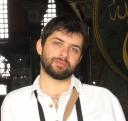The Tiger’s Wife
Téa Obreht
 I’ve read this book in its original language, English even though it has been published in (in Tea’s own words) “the most important of all translations”, Serbian. Because I love reading work in its original language whenever I can. And it was strange experience because I did recognize my own folklore but in the same time was thinking how there’s no way that anyone unfamiliar of that folklore would recognize it and more importantly, understand it.
I’ve read this book in its original language, English even though it has been published in (in Tea’s own words) “the most important of all translations”, Serbian. Because I love reading work in its original language whenever I can. And it was strange experience because I did recognize my own folklore but in the same time was thinking how there’s no way that anyone unfamiliar of that folklore would recognize it and more importantly, understand it.
OK we know Tea is from Serbia (or if you wish ex Yugoslavia) and that is what I believe was the starting point for many foreign (!) reviewers to place its plot here in Balkan region. I being from the region could find connections with it even though she (Obrecht) clearly put an effort not to make it obvious: the only two places mentioned in the book that actually exists in reality are Vienna and Istanbul. All other names are fictional and majority of them sounds quite impossible. The pretty much the same goes with the names of characters (and I’m not sure why she decided to do that). There are only few names that are names in reality. Moreover some of the names (for example Gavran which means “raven” or Dure or Darisa) are words you cannot associate with the person. Maybe those sounds interesting, exotic, or … for English speaking world (which is of course legitimate reason). So I asked myself how would you (if at all) know the plot is in ex-Yugoslavia? Yes there are hints like “we” are celebrating Christmas in January (ok so it is settled in the region where Orthodox Christians live); Muslims don’t have it, Catholics don’t have it but “they” do (meaning tree religions live in the same region); after the war Nobel Prize writer became theirs and we named our airport after that crazy scientist (writer is Ivo Andric but we consider him as ours and scientist is Nikola Tesla, airport is in Belgrade); numerous words she used in their native form (vila, mora, hajduk, gusle, ajvar, … and about that it’s strange the English edition didn’t offer translations or explanation), some names, some last names… etc. So based on those things I would be able to conclude that the plot is settled in my region indeed BUT would I made the same conclusion without knowing these things? If I’m not from here? Well I doubt. But nevertheless it was interesting how everyone (I’m quite sure) without knowing those things, understanding the non-English words or recognizing the customs have placed the book here.
Saying all this I’m not sure can I give one objective review because there are so many things that I’m familiar with and this especially when she was describing air raids in an unnamed city. Of course it was all too obvious she’s speaking about NATO bombing of Serbia 1999 and yes those few pages where she describes those first days, weeks of bombing in real life were exactly how she described: disbelief at first and then people fled into shelters and they came out of the shelters deciding to be in the open, on the bridges, cafes, restaurants refusing to give up of those few scrapes of normal life they had. What a flashback that was! The story about the zoo during the bombing however was fiction.
The story is interesting enough. Really good actually if you consider it’s a debut novel so thumbs up. I did like drops of surrealism combined with a Slavic folklore but what I really loved is a painting of a mentality in a small isolated village and how they are facing fear of the unknown.
In the end it was fast and interesting read.







